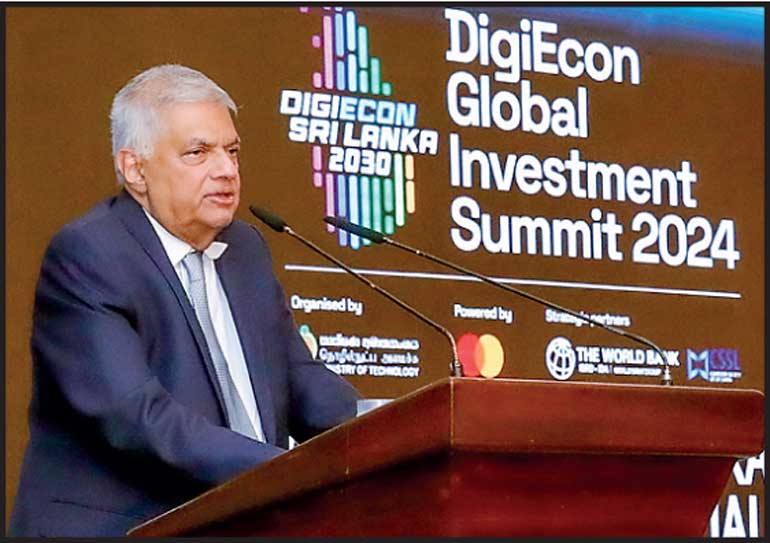Monday Feb 23, 2026
Monday Feb 23, 2026
Wednesday, 26 June 2024 00:00 - - {{hitsCtrl.values.hits}}

President Ranil Wickremesinghe
By Charumini de Silva
In a forward-looking address, President Ranil Wickremesinghe yesterday outlined a strategic vision to expand and modernise economy driven by digital transformation, technological innovation and strategic educational reforms by 2030.
Speaking at the first-ever DigiEcon Global Investment Summit (DEGIS) 2024, the President asserted the importance of leveraging technology and a skilled workforce to drive economic growth.
“The digital economy is crucial for fast growth. Innovation is the cornerstone of this system. We have identified tourism and agriculture modernisation as key sectors for rapid development,” he said, highlighting the need for a concerted effort to expand these sectors, focusing on technological advancements and workforce capabilities.
He called on the high-level industry leaders and private sector at the DEGIS 2024 to collaborate and contribute to this transformative journey, ensuring a prosperous future for Sri Lanka.
“I hope you will be able to contribute to enrich the thinking of the Government,” he added.
He announced plans for the Colombo Financial Zone, which will include provisions for offshore activities to attract more investments. “This will encourage global investors to engage with Sri Lanka, boosting our economic prospects,” Wickremesinghe added.
Wickremesinghe detailed several institutional reforms aimed at strengthening the country’s scientific and technological infrastructure.
“These include the establishment of a Chief Technological Officer to advise the Government, a new Technology and Innovation Policy and funding mechanisms for commercialising research. We are also creating the National Science and Technology Commission and the National Science Foundation to streamline funding and monitor the performance of research initiatives. This will prioritise Government funding for research, ensuring efficient and impactful use of resources,” he explained.
To address the human resource needs, the President proposed restructuring the vocational training system, consolidating various authorities into a unified structure and establishing new technical and management institutions.
“We need significant educational reforms to meet the demands of the digital economy. This includes restructuring the vocational training system into a unified authority with provincial agencies and nine vocational colleges,” he added.
He also outlined plans into introducing the concept of an Associate Degree, a two-year program designed to enhance technical and managerial skills. “Three new universities focusing on technology and management are planned, starting with the University of Kurunegala, modelled after the Kotelawala Defence University (KDU). The Second University will be in Seethawaka and the third one somewhere out of Colombo,” he said. In addition, he said the National AI Centre will be established to facilitate the digital economy by 2030.
The President noted that collaborations with foreign universities are in progress, including a new branch of Chennai’s Indian Institute of Technology (IIT) in Kandy.
He emphasised the importance of producing a skilled workforce to meet the demands of the evolving digital economy. “We may need to bring in trainers from abroad in the short term, but the long-term goal is to build a self-sufficient, highly skilled workforce,” he said.
He also mentioned upgrading existing universities to offer courses in engineering and AI, ensuring graduates are equipped for future job markets.
The President acknowledged the importance of supporting freelancers and the private sector, whilst proposing rules to facilitate freelance work and ensure that companies can operate without disruption. Additionally, he mentioned efforts to secure financing at concessional rates to support private sector growth.
He also discussed the importance of providing employment opportunities for graduates, especially those from Arts Faculties, to ensure they can contribute effectively to the economy.
Wickremesinghe reiterated the Government’s commitment to developing tech cities and securing funding to support these initiatives.
The President also discussed the broader implications of the digital economy, particularly in the context of Sri Lanka’s strategic position between tech giants China and India. “We must utilise our geographical advantage and foster cooperation with these two giants in hardware and software to advance our knowledge and capabilities,” he said.
Wickremesinghe revealed that discussions with India and initial engagements with China are already ongoing to build a robust National Digital Platform.
Agriculture modernisation, President Wickremesinghe noted, will go hand-in-hand with the growth of the digital economy.
He pointed out that Sri Lanka, with its small average landholdings, needs to adopt smart agriculture techniques. “We are looking at modernising agriculture to maximise the potential of small landholdings. Utilising technology and developing a capable workforce are essential for this transformation,” he said.
Wickremesinghe highlighted the potential of modernising agriculture through smart technologies. Despite the small average farm sizes, he stressed the opportunities for growth by adopting new technologies and practices.
“We are a country with average holdings sometimes less than one acre, but we are trying to expand to two or three acres, looking at the immense potential we have,” he stated.
Wickremesinghe also emphasised the need for infrastructure development to support technological growth. “Plans include the creation of Tech Cities, with Colombo and other regions identified as potential sites. These cities will serve as hubs for innovation and economic activity, providing the necessary environment for tech companies to thrive.”
